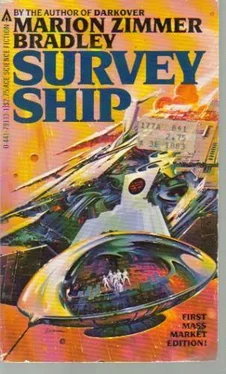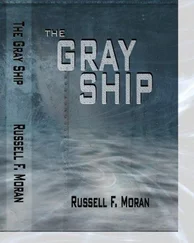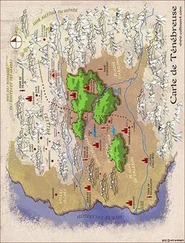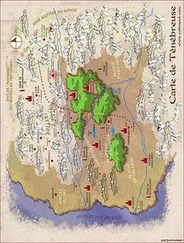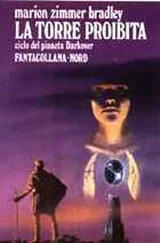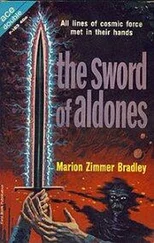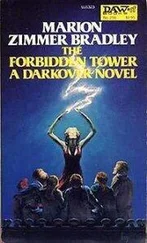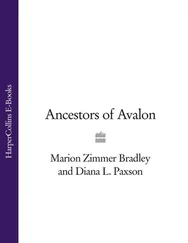Silence; and six stricken faces on the Bridge. None of them had to put it into words. Every one of them knew that without accurate information from the computer, they were all hopelessly lost, adrift among the stars without accurate data enough to know where they were going, or even where they were.
It was Fontana who first put the question in all their minds:
“Can it be fixed?”
Ching struggled against her growing fears — fear that she would lose control, somehow do or say the wrong thing. She said, slowly and precisely, “A computer is a machine; we can do everything the computer does, only not quite so quickly or so well. And once I can find what is wrong with it — mechanical damage, a mistake in the original programming, once we know precisely what is wrong, it can be repaired. Repaired, that is, if the damage is mechanical; re-programmed, if it’s a case of human error. We are particularly fortunate to have Ravi with us, because he can be used to check the accuracy of the computer. That’s not the problem. The problem is—” and she swallowed hard, trying to steady the shameful terror in her voice, “that all during the time we’re trying to find out what’s wrong, and trying to fix it, we’re still accelerating at a steady one gee — that means nine point eight meters per second per second — piled on to whatever velocity we’ve attained in the past two-and-a-half days. And every second we use to get it fixed, we’re going further and further off course! An error of a thousandth of a degree in course might not make any difference at all on the surface of the Earth; because there’s only twenty-four thousand miles you can go, and you’re right back where you started. But out there — “Ching made a numb gesture at the infinity of stars beyond the observation window, and clutched at her seat, feeling as sick and dizzy as if the gravity had somehow gone off and she was falling endlessly through space, ”out there, a thousandth of a degree here can get us millions of kilometers, light-years off course at the other end…. We may never reach the T-5 cluster at all, we may never reach anyplace humans have gone before! We don’t know if Peake ever laid in the right course at all, or where we’re going, or where we’ve been… it’s probably too late to get back on the right course, even if we could find out, now, what course we should have taken from just outside the Space Station! We’re going out into the unknown whether we want to or not — and we don’t know where!”
In the silence following Ching’s outburst, the sails rotated, slightly, so that they could all see the transparent shimmer of the film across the observation window; behind them the stars blurred. All sails set, Peake thought, and acclerating at full speed — to nowhere.
Ravi said calmly, “It can’t possibly be as bad as that, Ching. We have a known position for the colonies and for the T-5 cluster, and fixes for most of the known stars. Surely, once the computer is working properly again, we can find out exactly where we are, compared to where we ought to be, and reset a proper course to take us there. The ship is maneuverable, after all, it’s not as it was in the old days of the unmanned probes, where once set in orbit, the probe continued until it either crashed into something, or fell apart. We can maneuver fairly well; if we absolutely had to, we could cut acceleration, coast to rest inside the orbit of Pluto until we knew exactly where we were and in what direction we had to leave the Solar System, and then restart the drives. Theoretically, we could even turn ship 180° and decelerate back in the direction we came, to the point of the original error.”
Peake made a small weak sound, almost a giggle.
He said, “I can hear it now. We slide into orbit alongside the Space Station. They say, hey, what, back already? We told you not to come back till you found us a habitable planet. And we say, sorry, folks, the computer you gave us doesn’t work…”
Moira made a small finicky adjustment to the replaced sails. She reminded herself of a woman pulling herself together after a rape, trying to reassure herself I that she is still alive, still essentially undamaged, still able to function. She tried to recapture the ecstatic sensation of being at the center of a great web, controlling the movement of the ship, controlling the flow of the universe — it would not come. All she felt was the shaking of her own hands on the controls; the one thing that was real to her, the perfection of machinery, solid and without human fragility and limitations, had been breached. She looked at the sail blurring the stars and thought of the thickness of it, measured in micrometers. How frail and frangible it seemed, shivering in the vacuum, cold against space as she was cold in the heated cabin.
Teague was looking at the great disk of Jupiter, and. regretting the lack of the stability of a planet to take any sort of standard observation. He knew Jupiter’s position in the Solar System, but he did not know precisely where the Ship was and that meant that he had no way of knowing precisely where anything else was, relative to it. But he said, “We have an absolute set of locators out there; Jupiter and its moons. We can find out precisely where they are and where they ought to be at this moment in Universal Time—” he gestured at the cumbersome True Time figures still streaming, [ with relentless, pulsing precision across the room of the cabin. “Even if we had lost all the cosmic data in the computer, we could re-calculate it all from the position of Jupiter and the Sun.”
The Sun’s disk, very far away, very dim and pale and only a blot against the stars, at a far corner of the lenticular window, seemed incredibly distant. Suddenly there was the loud clanging of an alarm; they all jumped, and Fontana gasped as the red pulse of an alarm-light flicked on and off.
Moira’s hands were already moving, trimming sails. She said, “I’ve got it; just a proximity alarm; a hunk of debris.” She reached to cut off the sound, the vibrating red carbuncle of the emergency light. “Wherever we are, I don’t like it here and I suggest we change course enough to get well out of the plane of the asteroids. We aren’t maneuverable enough to run the gauntlet of the asteroid belt.”
Ching, by automatic reaction, touched the computer console, and stopped dead, her hands frozen. She said weakly, “That’s no good, Teague. You know where we are in reference to the asteroid belt and Jupiter—”
“I can get us well off the plane of the ecliptic, and that’ll keep us away from most asteroids,” Ravi said, “but Ching, you’ve got to do something about the computer as fast as you can. How long will it take you to check it out?”
“There are a few things I can do right away,” Ching said, “I can probably have some idea of what’s wrong inside a few minutes.” She touched a few buttons, frowned at the results, repeated the process. Then she whistled, a small, sharp sound.
“Peake,” she said, “enter the course you laid. Let me watch you do it.”
Slowly, meticulously, rechecking it with the tiny calculator which was part of every navigation student’s permanent equipment, as much a part of him as his head, Peake found the figures and ran them into the computer. Ching watched, frowning a little.
“Now you, Ravi. Show me exactly what you did.”
Frowning, Ravi complied.
“All right,” Ching said, “I know what’s wrong. Or — wait,” she qualified, as five faces turned to her in expectant hope, “I’m not sure whether there are mechanical bugs in the computer itself; I’ll have to get in there and find out. I’d have to do that, anyhow, to find out what’s wrong with the DeMags, if Teague and Moira are sure there’s no mechanical problem in them. But I know how we can get, at least, mathematical right answers out of the computer, because I know why it’s giving us wrong answers. Ravi, are you aware that when you were converting the acceleration factor into days, you divided everything by twenty-four instead of twenty-four point zero?”
Читать дальше
